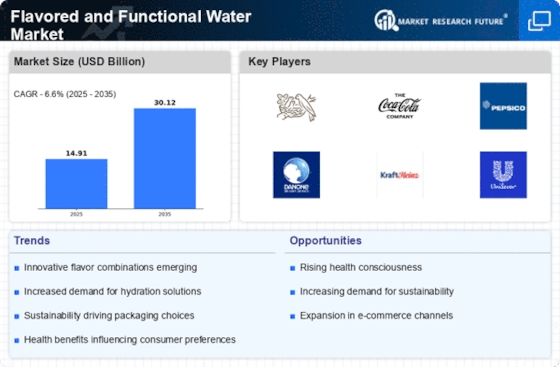Top Industry Leaders in the Flavored Functional Water Market

The Flavored and Functional Water market, a significant segment within the global beverage industry, is shaped by a competitive landscape influenced by factors such as changing consumer preferences, the emphasis on health and wellness, and the demand for innovative and functional hydration options. As of 2023, key players strategically position themselves in this competitive environment, implementing various strategies to maintain or enhance their market share.
Strategies Adopted:Key players in the Flavored and Functional Water market deploy a range of strategies to remain competitive. Continuous innovation in flavor profiles, functional additives, and packaging technologies is a central strategy. Strategic partnerships and collaborations with wellness influencers, fitness experts, and health professionals contribute to promoting the health benefits of their products. Marketing efforts often focus on branding, product differentiation, and promoting the natural and low-calorie attributes of flavored and functional water. Companies also engage in mergers and acquisitions to expand their product portfolios and gain access to new markets.
Market Share Analysis:Market share analysis in the Flavored and Functional Water market is influenced by several factors, including brand recognition, product quality, pricing strategies, and distribution efficiency. Companies with strong brand equity and a reputation for producing high-quality, innovative products tend to secure a larger market share. Pricing strategies that balance affordability with perceived value play a crucial role, especially given the price sensitivity of consumers in the beverage market. Effective distribution networks, covering both traditional retail channels and e-commerce platforms, are vital for maintaining a competitive edge.
New and Emerging Companies:While key players dominate the Flavored and Functional Water market, new and emerging companies are entering the sector, often focusing on niche markets or introducing unique functional formulations. These entrants may emphasize natural ingredients, adaptogenic properties, or cater to specific dietary preferences, contributing to the overall diversification and innovation in the Flavored and Functional Water market. Although their market share may be relatively modest compared to industry leaders, these companies play a crucial role in driving innovation and responding to evolving consumer demands.
Industry Trends:The Flavored and Functional Water market has witnessed noteworthy industry news and investment trends in 2023. Key players are investing in sustainable packaging solutions, emphasizing eco-friendly materials and reducing their environmental footprint. Collaborations with wellness and fitness influencers contribute to building a health-focused brand image. Additionally, investments in technology adoption, such as advanced bottling and filtration systems, aim to enhance production efficiency and maintain product quality.
Competitive Scenario:The overall competitive scenario in the Flavored and Functional Water market is marked by intense rivalry among key players striving to capture a larger share of the growing market. The industry's competitiveness is evident in the emphasis on innovation, sustainability, and strategic collaborations to address evolving consumer preferences. The global reach of these companies enables them to adapt to regional tastes, capitalize on emerging markets, and navigate regulatory landscapes, contributing to the overall dynamism of the industry.
Recent Development:Nestlé: In an effort to maximise hydration for particular forms of activity, the company collaborated with experts to create a new electrolyte blend for Nescafé Gold Rush.Coca-Cola: Highlighted the need of particular electrolytes for hydration and performance with the introduction of the Powerade ION4 Advanced Electrolyte System.
Key Players:Groupe DanoneNestle SAThe Coca-Cola CompanyPepsiCoHint WaterNew York Spring WaterKraft FoodsBalance Water CompanySunny Delight Beverages Company.











